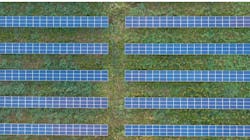AgriSolar Partnerships Bloom in Minnesota
Minnesota energy companies, solar developers, farmers, and chefs are partnering in innovative ways to grow food, renewable energy, and pollinator habitat all within the same piece of land. The National Center for Appropriate Technology’s (NCAT) AgriSolar Clearinghouse today released its short film “Dive into the Prairie,” which takes viewers on a short tour of Minnesota’s agrivoltaic success stories.
AgriSolar or agrivoltaic partnerships are growing across solar-appropriate farmland in the U.S., providing a new revenue source for farmers, clean energy for surrounding communities, and myriad benefits to crops, livestock, and pollinators.
Chef Mateo Mackbee uses solar-grown foods at his St. Joseph, Minn., restaurant. Everything from salad greens grown under or around solar panels, to the honey that sweetens his salad dressing.
“Agrivoltaics is a big thing for me to see what can be grown, grazed, or raised in and around solar arrays,” said Chef Mackbee. “AgriSolar is the future, for sure.”
“The partnerships blossoming in Minnesota show a real-world example of how it can work for several industries that share common goals,” said NCAT Energy Director Stacie Peterson, PhD. “Land is finite, and AgriSolar partnerships mean we can maximize our resources for the benefit of communities, the environment, and businesses.”
NCAT’s AgriSolar Clearinghouse is connecting businesses, land managers, and researchers with trusted resources to support the growth of co-located solar and sustainable agriculture.
“Pollination is a huge part of what commercial beekeeping is,” said Bare Honey founder Dustin Vanasse. “We have our co-located honeybees and those, combined with the native pollinators on these sites, will provide pollination to the farms that are around the site.”
Mackbee sources solar-grown honey from Bare Honey, which partners with energy companies and solar developers to place his commercial beekeeping boxes on the same land as the solar panels and pollinator habitat.
